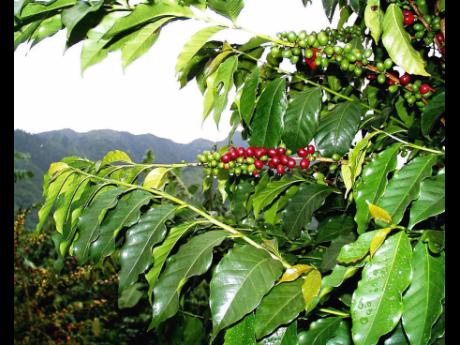Shaw mulls more protectionism for coffee
Audley Shaw, the minister with portfolio responsibility for agriculture, is considering new taxes on coffee that would hand a victory to local producers who have been lobbying for an adjustment to the import cess as a protective blanket around the sector.
Most of Jamaica's pricey coffee is exported, which leaves cheaper imports to fill the gap. As the product labels on Jamaica's grocery shelves show, local brands hardly use Jamaican beans.
"We are not ruling out the business of putting on additional taxes on the importation of coffee. But it has to be a two-way street," said Shaw at the press conference in which banker and coffee investor Michael Lee-Chin gave away $60 million of his personal funds to assist coffee farmers affected by falling prices.
His reference to the trade-off relates to whether Jamaican operators have the ability to produce in sufficient quantities to meet the needs of the local market. Production of Jamaica Blue Mountain coffee, JBM, is currently tracking at a third of its high mark in previous years, that is 230,000 boxes now, compared to around 700,000 boxes then.
Jamaica imports coffee in various stages of production, such as green beans or processed roasted ground coffee. Roasted bean imports are barred.
A cess of US$1.41 per kilogramme was imposed on imported green beans and US$2.40 per kg on roasted ground coffee on April 1. There is also a 40 per cent duty on imported roasted ground coffee and 20 per cent on instant coffee, but no duty on imported green beans.
One option before Shaw, the minister of industry, commerce agriculture & fisheries, is the possibility of a ministerial order; another involves the minister of finance and, Cabinet looking at a scheme to gradually impose taxes on the importation of coffee over time, he explained.
"But at the same time, in a commensurate way, we want to be planting more coffee here in Jamaica. It has to be a trade-off. The more we plant, the more I will be obliged to impose additional duties on coffee coming into the country," Shaw said.
He urged farmers to plant more coffee utilising existing farms in order to improve productivity. Coffee farmers two years ago earned as much as $12,000 a box for coffee seeds, but are now paid around $3,000 per box.
It's a trend experienced globally. Coffee prices dropped again in August and were 20 per cent lower year-on-year, hitting a 57-month low, according to the International Coffee Organization, which blamed market fundamentals and a bit of exchange-rate fluctuations.
Local small coffee farmers want the cess to incentivise the purchase of more local beans by large companies that process coffee.
Jamaica imported about US$2.4 million worth of coffee in 2017, according to the latest data from the United Nations Trade Centre. The coffee trade balance for Jamaica stands at US$20.48 million, which means the island exports nearly 10 times what it imports.
Even so, the imports grew by 32 per cent year-on-year, with the majority of imports coming from Mexico at US$930,000, followed by the United States, Colombia, Guatemala and Ethiopia, respectively. Mexico is known for producing commodity-priced beans but without the pedigree of a Colombia or Guatemala.
Producers import coffee in order to sell by itself or to produce blends of foreign and Jamaican coffee.
In pushing the case for farmers, Oswald O'Meally, director of the Coffee Growers Association, which generally represents small farmers, analogised that no car dealer sells a blended Rolls-Royce or Mercedes-Benz.
"As long as we continue to blend our Blue Mountain coffee, it will become derogated, unusual and misused. So we have to take a stand to stop importing," said O'Meally.
Shaw indicated, however, that his assessment would consider market realities.
"You cannot turn [back] the global propensity for blending," the minister said.

